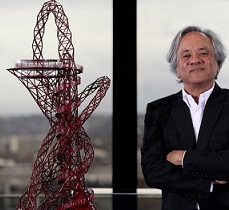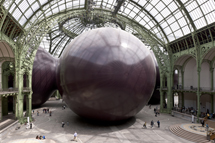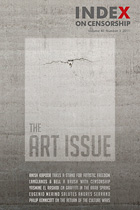18 Jun 2012 | China
The Chinese delegation of commissioning editors has pulled out of the Sheffield Documentary Festival due to the screening of a film about artist Ai Weiwei called Ai Weiwei: Never Sorry. Directed by Alison Klayman, the film observes the subversive Chinese artist as he balances his art in Beijing with the politics that inform it. The internationally famous artist is one of the Chinese regime’s most outspoken critics and the film documents his working process, his family life and his clashes with police and authorities between 2008 and 2010. The film came to prominence when the artist was arrested over alleged tax-fraud in 2011.
 Seen as the poster child for acceptable, overt political dissent in the mainstream, Wei Wei challenges the censorship and suppression of free expression in China. He turns ordinary items into the unexpected. Some works are like subtle asteroid strikes — like filling Tate Modern with delicate handmade sunflower seeds. Others, such as a notorious photograph of Weiwei flashing a middle-finger salute at Tiananmen Square, are more direct. All of it is an affront to the rosy, progressive image of a happy China willing to profit from capitalism but rejecting of democracy.
Seen as the poster child for acceptable, overt political dissent in the mainstream, Wei Wei challenges the censorship and suppression of free expression in China. He turns ordinary items into the unexpected. Some works are like subtle asteroid strikes — like filling Tate Modern with delicate handmade sunflower seeds. Others, such as a notorious photograph of Weiwei flashing a middle-finger salute at Tiananmen Square, are more direct. All of it is an affront to the rosy, progressive image of a happy China willing to profit from capitalism but rejecting of democracy.
One of the scheduled Chinese delegate sessions at Doc/Fest would explore how filmmakers could work as creatives with Chinese outlets, platforms and agencies. Seen as a new and exciting market and target audience to documentary makers, festival organisers regret the delegation’s 11th hour decision to withdraw.
Heather Croall, director of Sheffield Doc/Fest says:
Officially we have been told that the reason the Chinese delegation cancelled is related to a restriction on the number of travel trips they can make to Europe. Unofficially though, there were a number of difficult conversations regarding films we are screening in our programme that challenge issues of freedom of speech in China. We came under pressure to not show certain films. We resisted the pressure, and the films remain in the programme.
Filmmaker and journalist Sean McAllister, whose film “The Reluctant Revolutionary” features at the festival, says the Chinese delegation’s withdrawal has sparked the Streisand Effect.
“They’ve succeeded in promoting the very film they are boycotting because everyone wants to see it now. Maybe this time off will give [the Chinese] some time to reflect on their support for Assad’s murderous regime [in Syria].”
Festival organisers say that the official Chinese delegation cancelled on 5 June – one week before its start. The programme also features a film on Chinese citizen journalists fighting against the Great Firewall of China called “High Tech, Low Life”. The delegation’s attempts at censoring the Festival have resulted in them banning themselves and a Doc/Fest spokesperson said “there may still be some Chinese producers and directors who’ve attended independently.”
The delegation of 10 and the Chinese embassy in London could not be reached for comment.
Leah Borromeo is a journalist and filmmaker who has worked as deputy foreign editor at Sky News, Channel 4 News and APTN
19 Mar 2012 | Asia and Pacific, Index Index, minipost
A crack in China’s firewall allowed dissident artist Ai Wei Wei to use a Twitter-like social media account for a short time on Sunday, before it shortly became inaccessible. The dissident artist was able to use micro-blogging platform Sina Weibo after discovering that his name was no longer blocked. Ai said his account was deleted shortly after midnight on Monday, and was replaced with a message that read: “Error. Invalid Weibo user”. During the short time the artist’s account was active, he attracted over 10,000 followers. New regulations which require Beijing-based microbloggers to declare their real names went into effect on Friday.
26 Sep 2011 | Magazine, News and features, Volume 40.03 Autumn 2011
 Earlier this year, the arrest and detention of Ai Weiwei, China’s most famous artist and Index contributor, caused an international outcry. In an exclusive interview with Index, celebrated sculptor Anish Kapoor explains why artists have a duty to take a stand for freedom of expression
Earlier this year, the arrest and detention of Ai Weiwei, China’s most famous artist and Index contributor, caused an international outcry. In an exclusive interview with Index, celebrated sculptor Anish Kapoor explains why artists have a duty to take a stand for freedom of expression
Index: When you made the decision to withdraw from the show in Beijing and to make a stand for Ai Weiwei, had you ever made that kind of political gesture before?
Anish Kapoor: When Ai Weiwei was arrested, I was doing this work in Paris at the Grand Palais [‘Leviathan’, pictured below]. I thought about it long and hard –– should I, shouldn’t I dedicate the work to Ai Weiwei? What does it mean? One has to be very clear that in doing such a thing you never do it without a degree of self-interest. I needed to understand what my self-interest was and what I was trying to do. Was this about Ai Weiwei or was it about me? And I decided in the end that as one of the big shows in Europe during the summer, I could dedicate it to Ai Weiwei and that it wasn’t about me. I discovered in doing it that actually I have a voice that I probably didn’t know I had before and I think that’s very important. And then I felt that since I’d already taken a stand, the show that the British Council was planning [“UK Now” in China next year] required a further stand. I think it’s essential that while there are still a hundred and more people locked up in Chinese jails — I’m talking about intellectuals, I’m not for the moment talking about ordinary people who go on the internet — I think it’s the duty of all artists to stand up and say we won’t take part. I’ve called out to artists all over — don’t take part, don’t show in China. A few have started to respond. I see that Daniel Buren, the great French conceptual artist, has pulled a show in China, and there are others. I’m glad to see it. It means something.
Index: You also proposed that galleries close for a day across the world and said it would be good for the art world to come together more.
Anish Kapoor: It’s perhaps naïve of me, but I think it’s important that we stand together for colleagues. It’s very hard for galleries to close for a day, but rather than a negative action, I feel in the end we were about to make a positive action on the anniversary of the 100 days of Ai Weiwei’s incarceration, but thankfully he was released. The positive action was to try and get thousands of galleries all over the world to show a work of Ai Weiwei’s.

Artists under threat
Index: China is an extreme case in the degree to which it controls, and attempts to control, freedom of expression. Would you like to see the art world being more politically engaged and showing more solidarity? There’s a very long tradition of writers coming together, but not in the art world.
Anish Kapoor: The art world is extremely fragmented. It is a place that’s also infiltrated by money and other instruments of influence. And it never finds itself in a place where it can shout. I think we need to learn how to do that and find a way to have singular voices. Through the whole period of Soviet repression of artists, which was severe, the art world didn’t say a thing. The avant-garde has held itself away from human rights. It’s been a great struggle for artists of non-European origin. It’s been a great struggle for women artists, quite contrary to the sense that the aesthetic world is an open forum –– it isn’t. It’s extremely doctrinaire and extremely partisan. And I think those battles are still being fought. So it’s not surprising at one level anyway.
I can only explain it by [the fact that] these old instruments of power in the art world are generally male and white, and within a certain aesthetic tradition. All of that has begun to fall apart in the last decade or so. We still haven’t got to the point where, if you like, lone, outsider voices can be properly heard. Ai Weiwei is a celebrity, so it’s relatively easy [for him to be heard] –– much harder in many other cases.
Index: Artists are more subject to arbitrary censorship wherever they are –– whether in the free world or more repressive world.
Anish Kapoor: I think it’s also because contemporary visual culture isn’t uni-directional.  When you write a piece, you have to articulate a precise point in words – political or otherwise. An art work can be nebulous in relation to the politics of its situation. It can indicate a discomfort without actually articulating it and therefore it’s much harder to pin down. It’s much harder to say: ‘This is subversive.’ It’s hard to define what subversive is –– especially in contemporary language and contemporary visual culture. Ai Weiwei, in that sense, is somewhat more articulated towards a series of events — noting down the number of people killed by corruption and maladministration, or collecting and making monuments with marbled doors of all the houses that have been knocked down and land that’s been taken away from the so-called squatters. It’s still nebulous though. If you look at the work it’s just a bunch of marbled doors. It doesn’t obviously say what we infer from it. Though we know what to infer of course.
When you write a piece, you have to articulate a precise point in words – political or otherwise. An art work can be nebulous in relation to the politics of its situation. It can indicate a discomfort without actually articulating it and therefore it’s much harder to pin down. It’s much harder to say: ‘This is subversive.’ It’s hard to define what subversive is –– especially in contemporary language and contemporary visual culture. Ai Weiwei, in that sense, is somewhat more articulated towards a series of events — noting down the number of people killed by corruption and maladministration, or collecting and making monuments with marbled doors of all the houses that have been knocked down and land that’s been taken away from the so-called squatters. It’s still nebulous though. If you look at the work it’s just a bunch of marbled doors. It doesn’t obviously say what we infer from it. Though we know what to infer of course.
Index: I’m also thinking of artists in the West. There’s a famous case of the Smithsonian last year bowing to conservative pressure. There’s galleries in London that have problems when they show the work of Sally Mann for example.
Anish Kapoor: I think we have a very carefully defined sense of what’s acceptable, especially if it goes near children or pornography — all those much more difficult areas. Censorship is there and some of it is okay, I assume. But how we monitor it is important.
Index: When you say it’s ok …
Anish Kapoor: I can see that there’s a reason to monitor pornography and paedophilia, especially unacceptable things, and we have to understand that anything that encourages them has to be watched carefully. I understand that impulse but we go there, even there, with great care.
Index: Artists are by the very nature of their work going to be more vulnerable to pressures of conservatism or conformism.
Anish Kapoor: Of course. There’s a kind of naughty boy or naughty girl way of doing it which a lot of artists have taken — why not? I’m not that kind of artist at all. I feel that agitprop as a method is problematic — for me — in terms of my poetic understanding of what a work can be.
When it comes to governments, economic interests override human rights
Index: I wanted to ask you about the British Council’s response to the dilemma of artists displaying work in countries that have a poor human rights record. Chief executive Martin Davidson has said: “It is through cultural exchange that we best demonstrate the benefits of free artistic expression and build supportive links between people in the UK and China.”
Anish Kapoor: I say phooey to that I’m afraid. I did suggest to them [that they] ought to make the central piece in the [UK Now] show a kind of dedication to Ai Weiwei — or to one of the other artists. If they’re going to do this show then they ought to have [Chinese] artists properly take part. The governmental view over the past 30 years has been we’ll speak quietly in public and loudly in private. Well, 30 years of doing that hasn’t done a damn thing. We had the premier of China here [in London] and Cameron was silent on the subject. [Was that] just because Ai was released? No, that was carefully timed. And I think silence says that there are economic interests that override human rights interests. It’s disgraceful.
Index on Censorship: China’s one of the most flagrant examples [of human rights abuse], Iran would be another. Would you start applying the same [tactics] to other countries?
Anish Kapoor: One has to. In the end one has to. Iranian culture, like Chinese culture, is extraordinary. One has to take a moral stand in a way with colleagues for solidarity. I think it’s important to understand in this also that governments are ineffective. I think that’s maybe the most important point of all. Individuals have to do it all. So therefore it’s our duty as individuals to stand up and say we won’t take part or protest. The Chinese don’t listen to anyone while there are government protests — I have absolutely no doubt whatsoever that it’s individuals making a noise all over the world that made them release Ai Weiwei. I’ve no doubt about it. Governments are just ineffective at this. And we have the power. We must do something.

This article appears in The art issue (Autumn 2011) of Index on Censorship magazine. Click on
The Art Issue for subscription options and more
This issue is nominated for an Amnesty Award
 Seen as the poster child for acceptable, overt political dissent in the mainstream, Wei Wei challenges the censorship and suppression of free expression in China. He turns ordinary items into the unexpected. Some works are like subtle asteroid strikes — like filling Tate Modern with delicate handmade sunflower seeds. Others, such as a notorious photograph of Weiwei flashing a middle-finger salute at Tiananmen Square, are more direct. All of it is an affront to the rosy, progressive image of a happy China willing to profit from capitalism but rejecting of democracy.
Seen as the poster child for acceptable, overt political dissent in the mainstream, Wei Wei challenges the censorship and suppression of free expression in China. He turns ordinary items into the unexpected. Some works are like subtle asteroid strikes — like filling Tate Modern with delicate handmade sunflower seeds. Others, such as a notorious photograph of Weiwei flashing a middle-finger salute at Tiananmen Square, are more direct. All of it is an affront to the rosy, progressive image of a happy China willing to profit from capitalism but rejecting of democracy.



